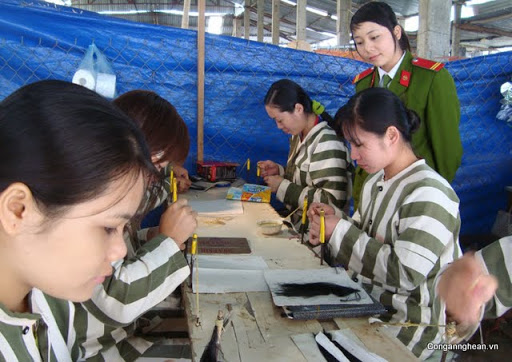Ensuring human rights in re-education of offenders
- Vietnam active at UN Human Rights Council
- Peace significant to promote human rights
- VN integrates human rights education into community activities
Vietnam supports humane treatment of prisoners through its policies, laws, and practical assistance programs.
In its platform, the Communist Party of Vietnam says: “People are the center of a country’s development strategy, and the subject of development. Human rights are respected, protected, and linked with the benefits of the nation and the people’s right of mastery”.
 |
| Photo: Congannghean.vn |
The Vietnamese state has signed virtually all international treaties on basic human rights. These rights are the foundation for Vietnam’s amnesty and re-education programs and support for convicted felons re-integrating into the community.
Investing in re-education of felons
Since 1957 Vietnam has participated in four treaties of the Geneva Convention that establish standards of international law for humanitarian treatment in war and protection of war victims.
In 1981, when Vietnam was still subject to the US’s embargo, it signed the Convention on Elimination of All Forms of Racial Discrimination, the Convention on Elimination of All Forms of Discrimination Against Women, the Covenant on Economic, Cultural, and Social Rights, and the Covenant on Civil and Political Rights. In 1990, Vietnam signed the Convention on the Rights of the Child.
In 2014, Vietnam ratified the Convention against Torture and Other Cruel, Inhuman or Degrading Treatment or Punishment (commonly known as the UN Convention against Torture).
This required the government to invest in upgrading prisons, detention centers, improve prison conditions for detainees, and organize training classes for the disabled.
Ratification was pursuant to the 2013 Constitution’s chapter on human rights, and the fundamental rights and obligations of citizens.
To ensure the human rights of prisoners, the Vietnamese government issued a decree promulgating prison regulations and a decree amending and supplementing articles of the 1988 government custody regulations.
The amended 1988 Ordinance on the Enforcement of Imprisonment Penalties stipulates that detention centers must classify inmates according to the nature and seriousness of their crime. Female, juvenile inmates must be kept in a separate cell zone.
Detention centers must be carefully safeguarded, well-lit, and ensure sanitary. During their imprisonment term, prisoners should receive a medical check-up at least once a year, be involved in sports and cultural activities and have access to books, radio and TV.
Helping prisoners re-integrate into the community
In addition to ensuring their basic rights, Vietnam’s laws also mandate assistance to help prisoners re-integrate into the community.
The amended 1988 Ordinance provides that inmates can be made to work, learn a job, or study the law no more than 8 hours a day; the pay for inmates’ labor must, after deducting costs, be added to their food rations and welfare benefits; and reward funds must be distributed to inmates with outstanding work results or re-invested in work programs, education, and job training for inmates. Part of the reward fund must be used to help inmates re-integrate after they complete their prison terms.
If a felon exhibits good behavior during his incarceration, he may be freed ahead of his scheduled release date in accordance with the Law on Amnesty on the occasion of the Lunar New Year or Vietnamese National Day.
Between 2009 and 2015, Vietnam granted amnesty to 63,500 prisoners. In recent years, the Vietnamese state has promulgated many policies involving vocational training for inmates. Most of the inmates pardoned in 2015 were trained for a career before re-integrating.

